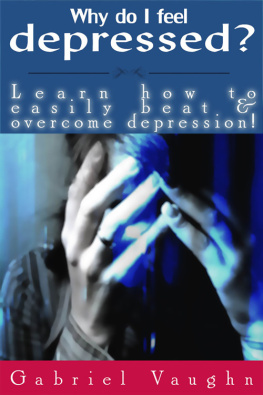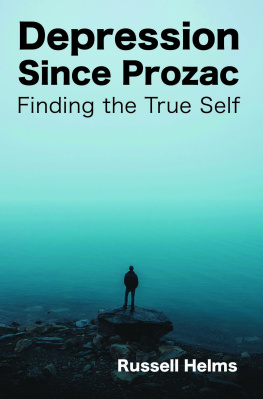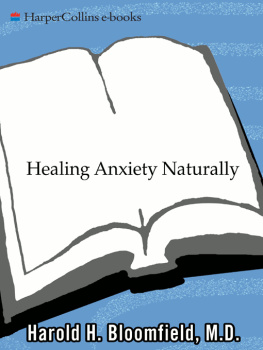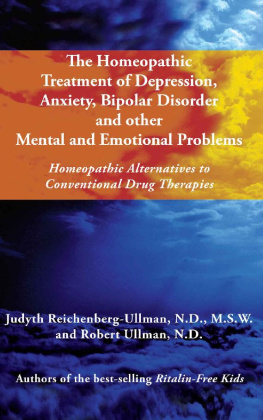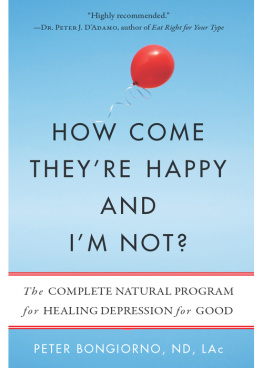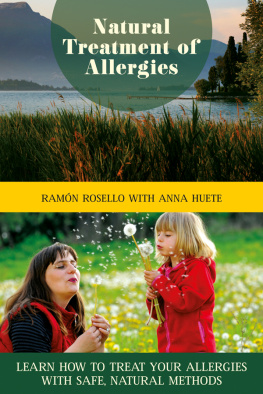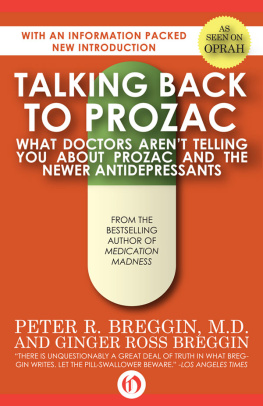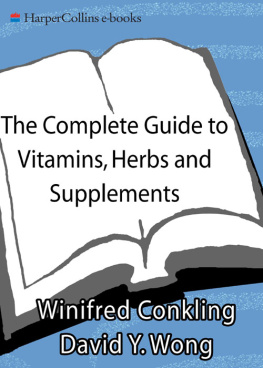
ACKNOWLEDGMENTS
I would like to thank Fred Deutsch for his tireless computer and technical assistance; Melanie Chenet, R.Ph., for her knowledge; Alan Christianson, N.M.D., for his interview and help; editors Jon Graham, Rowan Jacobsen, and Blake Maher at Inner Traditions; copyeditor Lee Wood; Robin Straus, my literary agent; Elizabeth Ripley, for her great dependability and loyalty; Alma Loya, for her love and continued support; and Mira and Avi Knishinsky, my wonderful parents. Thanks to all the people at Inner Traditions International involved with this project. And deepest gratitude to the researchers who have labored intensely to discover the mysteries of St. Johns wort and bring them to the public eye, including the writers of the St. Johns wort monograph. If it were not for them, this book probably would never have been written.
CONTENTS
CHAPTER 1
THE FOCUS IS ON ST. JOHNS WORT
St. Johns wort is already the favored therapy for depression in Germany, where it has been used therapeutically for centuries. Prepared as a tea, the herb was taken to calm frazzled nerves and revive a depressed spirit. It was also made into oil, which was sometimes used topically to relieve skin problems.
True to its folklore, an assortment of new clinical studies report that St. Johns wort provides measurable relief to people with mild and moderate depression without the side effects of drugs like Prozac. Apparently, their patients prefer it that way: the herb is currently outselling Prozac twenty to one in Germany.
St. Johns wort vaulted to international fame after several well-respected scientific journals published articles on this herbs potential use in the treatment of clinical depression. In 1994 the Journal of Geriatric Psychiatry and Neurology devoted an entire issueseventeen research papers in allto Hypericum: A Novel Antidepressant. One compelling study tracked the herbs effects on 3,250 patients battling mostly mild and moderate depression and found that about 80 percent either felt better or became completely free of symptoms after four It further outlined the various pros and cons associated with the administration of the herb and summarized its remarkable effectiveness in battling depression.
This herb has been the subject of incredible amounts of recent mass media attention. The focus of thousands of published articles across the entire United States, it has appeared in newspapers from the New York Times to the Los Angeles Times and in countless local papers across the country. Major news organizations, including news channel CNN and 20/20 have aired features on the benefits of the herb. National magazines such as Newsweek and U.S. News and World Report have jumped on the herbal bandwagon as well. Dozens of Websites offer information on this herb every day. Health stores, supermarkets, and mass-market venues all advertise and sell St. Johns wort.
Until three months ago, I had never heard of hypericum, writes Michael A. Jenike, M.D., in an editorial for the Journal of Geriatric Psychiatry and Neurology, but in reviewing these papers and other literature, I have been impressed with the potential of this compound as a therapeutic agent in the treatment of mild-to-moderate depressive illnesses, the kind of depressions that predominate in out-patient medical practices. The results of the many studies outlined in this Supplement form an impressive body of evidence indicating that hypericum may well be a potentially useful agent to treat mild-to-moderate depression. The study demonstrated that the herb is just as effective as certain prescription antidepressants for treating mild and moderate depressionand sometimes more effective. It is also without the many side effects common among prescribed antidepressants such as Prozac and its close relative Paxil. Furthermore, it is less expensive. Prozac costs, on average, one hundred dollars a month, while St. Johns wort, on the less expensive side, costs only about fifteen dollars a month. For someone on a tight budget, the herbal remedy may be a lifesaver. In addition, it is easily accessible since it is readily available without a prescription.
This all comes as good news to mental health professionals and patients. It finally looks as though a suitable alternative to prescription antidepressants may really exist. While prescription antidepressants are certainly effective and helpful for some, many others find St. Johns wort a blessing. Thanks to the willingness of the scientific community to engage in alternative studies of herbal medications, more people can be put at ease. An alternative means of treating depression and anxiety is here.
ST.JOHNS WORT BY ANY OTHER NAME
Like most herbs, St. Johns wort has several names. No one is quite sure how the herb acquired its name, but several tales have evolved across the ages. The most obvious explanation is that the herb was named after St. John the Baptist, one of the holy figures in Christianity. Wort is an old English word for plant. Legends tell us that the herb which flowers around June 24, the date St. John was beheaded, sprang from his blood. The red pigment of the plant is believed by some to represent the blood of the saint. Other stories claim the knights of St. John of Jerusalem used the herb to treat the wounds that they suffered on the Crusade battlefields. Despite the questionable authenticity of the myths, they have persisted throughout many centuries, and each myth, in its own symbolic manner, offers us a greater vision of the healing purposes of the herb.
The Latin name of the plant is Hypericum perforatum, and the herb often referred to as hypericum. Hypericum stems from the Greek word ereik, heather, with the prefix hypo, under, thus, a low-growing form of heather. Perforatum is translated as punctured and refers to the many tiny black-red dots that cover the leaves and flowers. In the sunlight, it appears as if the flower petals are perforated. A surefire way to recognize St. Johns wort is to rub the flowers and leaves between your fingers. If blood-red oil dyes your skin, then you can be certain you have correctly identified the herb. Believers in the doctrine of signatures, an ancient theory that every plant bears a clear sign of its use, once interpreted the tiny red dots as symbolic of blood, indicating St. Johns worts usefulness as a wound healer. Herbalists comment that the black-red spots contain the essential oils and resins responsible for the greater portion of its medicinal actions.
From ancient times through the Middle Ages, people thought St. Johns wort possessed supernatural powers, using it to defend themselves against disease and evil and to chase away the devil and ominous spirits.During the Middle Ages, illness was often attributed to evil spirits. Because St. Johns wort was supposedly endowed with magical powers, the ingestion of the herb was believed to keep the spirits from attacking. On St. Johns Eve it was burned in bonfires to purify the air and repel the spirits. The following poem, written around the year A.D. 1400, characterizes the medieval attitude toward the benevolent plant:
St. Johns wort doth charm all witches away
If gathered at midnight on the saints holy day.
Any devils and witches have no power to harm
Those that gather the plant for a charm.
Rub the lintels with that red juicy flower;
No thunder nor tempest will then have the power
To hurt or hinder your house; and bind
Round your neck a charm of a similar kind.
Centuries ago, people believed that the herb was imbued with the essence of St. John the Baptist; its ability to heal was directly related to the healing spirit of God and the authority of his saint. Nowadays, our perspective on the mechanisms of medicinal plants assumes an entirely scientific tone. Because an herbs mechanism of action can be explained in scientific terms, it no longer is in need of elucidation in religious terms. We are aware that active components within the herb are responsible for its various therapeutic effects and that the body contains complex chemicals keenly responsive to those active constituents. Scientific explanations appear to render the ancient myths invalid. But on second thought, what if the myths are real? All myths certainly convey bits of truth. After all, science is only recently discovering what old-time herbalists have known for centuries.
Next page

